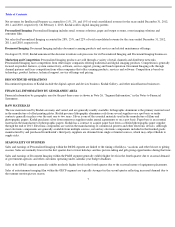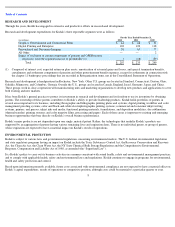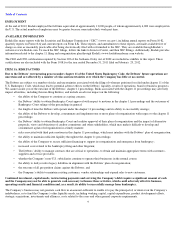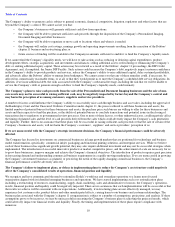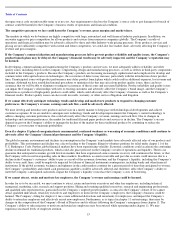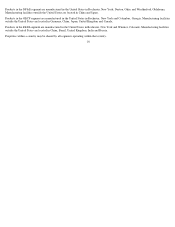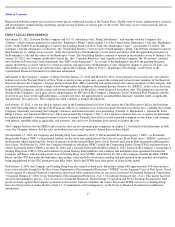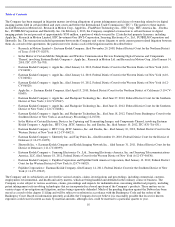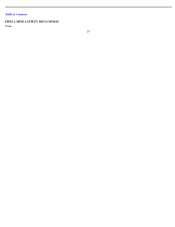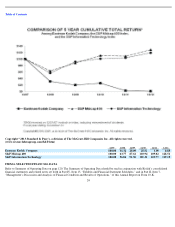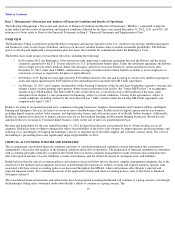Kodak 2012 Annual Report Download - page 18
Download and view the complete annual report
Please find page 18 of the 2012 Kodak annual report below. You can navigate through the pages in the report by either clicking on the pages listed below, or by using the keyword search tool below to find specific information within the annual report.
Table of Contents
The Company’s future results could be harmed if we are unsuccessful in the Company’s efforts to expand sales in emerging markets.
Because we are seeking to expand the Company’s sales and number of customer relationships outside the United States, and specifically in
emerging markets in Asia, Latin America and Eastern Europe, the Company’s business is subject to risks associated with doing business
internationally, such as:
There can be no assurance that we will be able to market and sell our products in all of the Company’s targeted markets. If the Company’s
efforts are not successful, the Company’s business growth and results of operations could be harmed.
We are subject to environmental laws and regulations and failure to comply with such laws and regulations or liabilities imposed as a
result of such laws and regulations could have an adverse effect on the Company’s business, results of operations and financial
condition.
We are subject to environmental laws and regulations in the jurisdictions in which we conduct the Company’
s business, including laws regarding
the discharge of pollutants, including greenhouse gases, into the air and water, the need for environmental permits for certain operations, the
management and disposal of hazardous substances and wastes, the cleanup of contaminated sites, the content of the Company’s products and the
recycling and treatment and disposal of the Company’s products. If we do not comply with applicable laws and regulations in connection with
the use and management of hazardous substances, then we could be subject to liability and/or could be prohibited from operating certain
facilities, which could have a material adverse effect on the Company’s business, results of operations and financial condition. The cost of
complying with such laws, and costs associated with the cleanup of contaminated sites, could have a material adverse effect on the Company’s
business, results of operations and financial condition.
New regulations related to “conflict minerals” will require the Company to incur additional expenses and could limit the supply and
increase the cost of certain metals used in manufacturing the Company’s products.
In August 2012, the SEC adopted rules requiring disclosure related to sourcing of specified minerals, known as “conflict minerals”, that are
necessary to the functionality or production of products manufactured or contracted to be manufactured by public companies. The new rules,
effective in 2013, require a report to be filed by May 31, 2014, and if applicable, require companies to undertake due diligence, disclose whether
or not such minerals originated from the Democratic Republic of Congo or an adjoining country. As a result, additional expenses will be
incurred in complying and performing due diligence in complying with the new rules. In addition, the implementation of the new rules could
adversely affect the Company’s sourcing, supply and pricing of materials used in the Company’s products. There may only be a limited number
of suppliers offering “conflict free” conflict minerals, and the Company cannot be certain that it will be able to obtain necessary “conflict free”
conflict minerals from such suppliers in sufficient quantities or at competitive prices. Because the Company’s supply chain is complex, the
Company may also not be able to sufficiently verify the origins of the relevant minerals used in the Company’s products through the due
diligence procedures that the Company implements, which may harm the Company’s reputation.
ITEM 1B. UNRESOLVED STAFF COMMENTS
None.
ITEM 2. PROPERTIES
Kodak
’
s worldwide headquarters is located in Rochester, New York.
•
supporting multiple languages;
•
recruiting sales and technical support personnel with the skills to design, manufacture, sell and supply products;
•
complying with governmental regulation of imports and exports, including obtaining required import or export approval for the
Company
’
s products;
•
complexity of managing international operations;
•
exposure to foreign currency exchange rate fluctuations;
•
commercial laws and business practices that may favor local competition;
•
multiple, potentially conflicting, and changing governmental laws, regulations and practices, including differing export, import, tax,
anti
-
corruption, labor, and employment laws;
•
difficulties in collecting accounts receivable;
•
limitations or restrictions on the repatriation of cash;
•
reduced or limited protection of intellectual property rights;
•
managing research and development teams in geographically disparate locations, including Canada, Israel, Japan, China, and
Singapore;
•
complicated logistics and distribution arrangements; and
•
political or economic instability.


